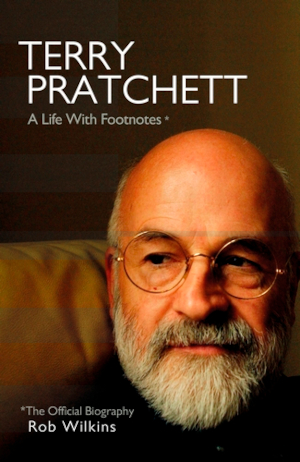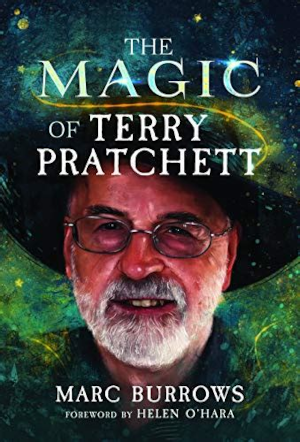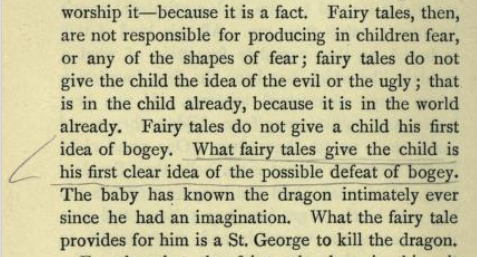Two years ago I read Marc Burrows’s The Magic of Terry Pratchett: A Biography. I said in part:
Burrows has done excellent work here…. Apparently there will be an authorized biography that will use Pratchett’s personal papers, which will be well worth reading. Burrows is always on the outside, without access to anything private and no help from his daughter (or wife, who is barely mentioned). Nevertheless, it is a complete biography, insightful and well-written (except for the footnotes, which are overused) and will be of interest to any Pratchett readers and Discworld fans.

That authorized biography is now out: Terry Pratchett: A Life with Footnotes by Rob Wilkins, who worked for and with Pratchett for two decades, as personal assistant, amanuensis, business manager, helper and more.
Wilkins knew Pratchett intimately and this biography is full of personal detail, especially about Pratchett’s decline and death from posterior cortical atrophy. How Pratchett handled that is admirable: he was open and honest about it, he got help, he kept working, he made documentaries about it, he contemplated how he might end his own life and made a documentary about that, he kept working, he kept working, up until he finished The Shepherd’s Crown and collapsed soon after. What he did while suffering from early onset Alzheimer’s is remarkable. The book also has a lot of details about the business of writing and publishing—advances and sales figures—which are interesting to see, and useful, because money was important to Pratchett.

But Burrows’s biography is better. He is on the outside and Wilkins was on the inside, but Terry Pratchett: A Life with Footnotes isn’t as insightful, it’s not as well-written, and the even more frequent footnotes are tedious. (Every writer about Pratchett needs to decide about footnotes. Based on these two books I think the answer is: don’t use them.) In Burrows’s book Pratchett’s wife and daughter get little coverage, which is understandable. Wilkins’s is the same, which is not, at least not without some explanation. Lyn Pratchett spun her own wool in the seventies and made a good lemon drizzle cake. That’s about all we learn about her. It’s fair to keep a spouse and child private, but that treatment needs to be explained. As it’s done here it’s a strange void that makes obvious there are important parts of Pratchett’s life left out and analyses not made.
There’s no real treatment of the content of Pratchett’s novels, which are what really matter. This isn’t a literary biography, and Wilkins is not a critic or scholar. This is a personal memoir about Pratchett. But how can any book about Pratchett’s life not tie it to his writing? Burrows gives fine coverage of the novels and talks about one of the most important things about Pratchett’s writing: the anger and rage that run through these comic fantasy novels. Anger and rage about injustice, unfairness, bigotry, prejudice, abuse of power, discrimination and dishonesty. Wilkins describes some anger, but it’s usually directed at employees such as him or people at publishers.
There is no index! No bibliography! And somewhere—I’ve flipped through the book and looked at all the footnotes twice but still can’t find it, because there’s no index—Wilkins misquotes Chesterton. He says something along the lines of how Neil Gaiman put it, that fairy tales don’t tell children monsters exist—children know they exist; fairy tales tell them monsters can be killed. One needs to be careful with that quote. Here it is, from “The Red Angel” in Tremendous Trifles (1909):

Fairy tales, then, are not responsible for producing in children fear, or any of the shapes of fear; fairy tales do not give the child the idea of the evil or the ugly; that is in the child already, because it is in the world already. Fairy tales do not give a child his first idea of bogey. What fairy tales give the child is his first clear idea of the possible defeat of bogey. The baby has known the dragon intimately ever since he had an imagination. What the fairy tale provides for him is a St. George to kill the dragon.
I looked up reviews of the Wilkins book. Kevin Power puts it well in the Irish Independent in “Fan’s-Eye View of Pratchett Misses the Big Questions” (2 September 2022):
Advice to famous writers: before you die, enshrine in your will an adamantine clause that forbids your personal assistant from writing your biography. Especially if your personal assistant happens to be a major fan of your work…. Some biographers practise the higher impartiality—analysing and then withholding final judgement. Wilkins practises the lower impartiality. He makes no judgements at all. He notices nothing, explains nothing.
Here’s Colin Steele in the Canberra Times in “Following the Ripples of Terry Pratchett’s Life with the Inner Parts Untouched” (15 October 2022):
Rhianna, who became an author and video-game creator, recalls her father being more of a “big brother” while her mother “was the disciplinarian”. Wilkins quotes Rhianna reflecting, at the age of nine or 10, that her father was always very busy, but there is no extrapolation of this comment nor are there details of Rhianna’s life as a teenager. Similarly, Lyn almost disappears from the book after the 1970s yet she surely played a crucial part in assisting and facilitating Pratchett’s success.
Pratchett’s family life couldn’t have been perpetually idyllic, given Pratchett’s rigorous work schedule and renowned temper. Wilkins recalled being summoned on more than one Boxing Day to Pratchett’s house, so that Pratchett could escape what he called “all this family shit” for “a little light work”. Pratchett’s great friend Neil Gaiman, the co-author of Good Omens, recognised that Pratchett was not simply the “ jolly old elf” of PR creation.
Christopher Priest did a review in the TLS: A Middlebrow Cult: The Official Biography of the Bestselling Fantasy Writer. He starts off by mentioning Jonathan Jones’s Guardian hit a few months after Pratchett died: Get Real. Terry Pratchett Is Not a Literary Genius. I like Jones’s art criticism but here he’s a complete tosser, and I’ve Read Pratchett Now: It’s More Entertainment Than Art doesn’t help any.
Priest ends with:
It is neither surprising nor shocking to learn that this popular novelist should have feet of clay. (He gave that title to one of his novels.) In many ways he conducted himself professionally better than most, and his expectations of other people in connection with his work were human and simple. The pleasure readers derived from his books is also genuine and lasting. The Terry Pratchett phenomenon continues, several years after his death. The comedic and narrative effects of his fiction seem timeless. Wilkins has written a good book, one the fans will love, but there is still room for an unofficial biography, written and researched by an unconnected third party. Not everyone will be convinced. To adapt Bob Dylan: something was happening here, but you didn’t know what it was, did you, Mr Jones?
The Magic of Terry Pratchett: A Biography by Marc Burrows is there and waiting. In a decade a bigger, richer biography will come along, with access to Pratchett’s files but by an outsider. Maybe Burrows will do it, maybe some equivalent of Deirdre Bair or Hilary Spurling. Until then, it’s where to start, and perhaps to end.
 Miskatonic University Press
Miskatonic University Press